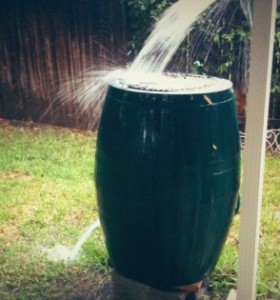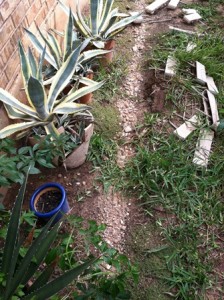I had the pleasure of attending the American Rainwater Catchment Systems Association (ARCSA) annual conference this past week in Austin. The topics focused on a variety of things–from legislation, to irrigating with rainwater, to storm water control, and using it for a potable water source, just to name a few topics. The conference (and the huge amount of rain recently!) has made me think a lot about how to take greater advantage of rainwater, or really, just collect more water.
Which leads me to a question I was asked by a resident recently that was along the lines of “I feel like I should be collecting rainwater, but don’t have any plants to water. Why would I do it?” It’s true, rainwater is so much better for your plants than the municipal water supply because of (1.) it’s high nitrogen content (the main plant fertilizer — the N part of PKN in the bags of fertilizer purchased at garden stores) and (2.) it’s softer water than tapwater. Around here, we have hard water, thanks to all the limestone in the area. These are probably THE main reasons folks collect rainwater.
However, an often overlooked, just as good reason is for (3.) erosion control. You don’t have to actually “use” the water collected, but if you could at least slow it down while it’s on your property (when falling from the sky); that would aid in reducing the amount of erosion your property is subjected to.
As easy visualization of what I’m talking about is the divots or valleys along the sides of a house where rain pours off the roof and bangs into the ground–typically if there are no gutters. See the picture on the right–it’s VERY obvious where the water lands when it runs off the roof. Where does the soil go that used to occupy that space? Well, it gets carried off down into the street, into the storm water system, which flows into our creeks. By the way, this water isn’t cleaned or treated, it doesn’t go to the waste water plant.
So, if that water can be slowed down, or stopped, that’s less soil that will be robbed from your yard each time it rains. You can collect the water in barrels, tanks, converted trash cans, and then release it, slowly, over your yard a few days after the rain event. Slowly is what’s key here, ideally we want the water to soak in, not run off. Then the barrel(s) is empty and ready to collect the next rainfall AND you don’t have to worry about mosquitos!!
Another way to slow down the water, and not worry with a tank, is with a rain garden. The City of Austin’s Watershed Protection Department has some good information about creating your own raingarden. http://www.austintexas.gov/raingardens
Other good reasons for collecting rainwater include:
4. It’s free! The water is anyway.
5. Collection tanks, barrels, and other components are tax-exempt and have been since around 2000. See the Texas Water Development Board’s website for more details about tax-exemption.
and (bonus reason #6.) The City of Round Rock does offer a rebate for water collection. See our website at www.roundrocktexas.gov/waterconservation for the application and details on the rebate.


